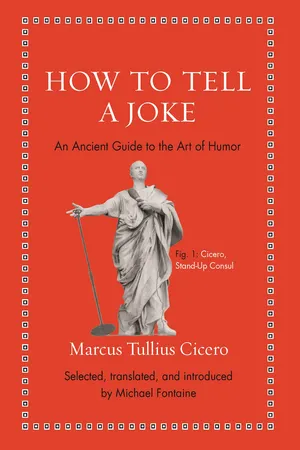
How to Tell a Joke
An Ancient Guide to the Art of Humor
- English
- ePUB (mobile friendly)
- Available on iOS & Android
About this book
Timeless advice about how to use humor to win over any audience
Can jokes win a hostile room, a hopeless argument, or even an election? You bet they can, according to Cicero, and he knew what he was talking about. One of Rome's greatest politicians, speakers, and lawyers, Cicero was also reputedly one of antiquity's funniest people. After he was elected commander-in-chief and head of state, his enemies even started calling him "the stand-up Consul." How to Tell a Joke provides a lively new translation of Cicero's essential writing on humor alongside that of the later Roman orator and educator Quintilian. The result is a timeless practical guide to how a well-timed joke can win over any audience.
As powerful as jokes can be, they are also hugely risky. The line between a witty joke and an offensive one isn't always clear. Cross it and you'll look like a clown, or worse. Here, Cicero and Quintilian explore every aspect of telling jokes—while avoiding costly mistakes. Presenting the sections on humor in Cicero's On the Ideal Orator and Quintilian's The Education of the Orator, complete with an enlightening introduction and the original Latin on facing pages, How to Tell a Joke examines the risks and rewards of humor and analyzes basic types that readers can use to write their own jokes.
Filled with insight, wit, and examples, including more than a few lawyer jokes, How to Tell a Joke will appeal to anyone interested in humor or the art of public speaking.
Tools to learn more effectively

Saving Books

Keyword Search

Annotating Text

Listen to it instead
Information
HOW TO TELL A JOKE
“I see a thief!”
♫“When his mouth’s on fire, it’s easier for a wise man to suppress the flames than a good remark (bona dicta).”♫
♫“When his mouth’s on fire, it’s easier for a wiseass to suppress the flames than a good wisecrack (bona dicta).”♫
“No surprise there: you did just get out of the spa.…”
Table of contents
- Cover Page
- Series Page
- Title Page
- Copyright Page
- Epigraph
- Contents
- Acknowledgments
- Introduction
- How to Tell a Joke (English)
- Epilogue
- Notes
- Bibliography and Further Reading
Frequently asked questions
- Essential is ideal for learners and professionals who enjoy exploring a wide range of subjects. Access the Essential Library with 800,000+ trusted titles and best-sellers across business, personal growth, and the humanities. Includes unlimited reading time and Standard Read Aloud voice.
- Complete: Perfect for advanced learners and researchers needing full, unrestricted access. Unlock 1.4M+ books across hundreds of subjects, including academic and specialized titles. The Complete Plan also includes advanced features like Premium Read Aloud and Research Assistant.
Please note we cannot support devices running on iOS 13 and Android 7 or earlier. Learn more about using the app